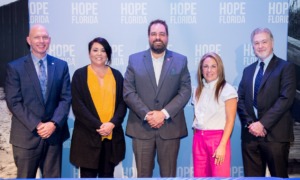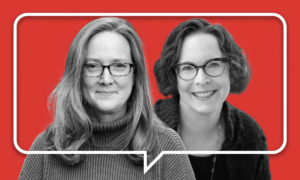Communities in Schools (CIS), the Alexandria, Va.-based national program that brings youth workers into schools, has expelled Janet Langmore, its CEO of the past two-and-a-half years. The former executive director of CIS operations in Canada, she proved to be too cold a customer for CIS’ quasi-evangelical business culture while failing to produce the big numbers optimistically forecast in CIS’ 1998 Annual Report. In it Longmore declares: “We must make sure we do not fall short for our children.”
Born in Atlanta, it would be no exaggeration to say that under the benevolent patronage of Gov. Jimmy Carter, CIS (known until 1996 as Cities in Schools) had grown steadily over the past two decades, particularly in Texas, Florida and North Carolina. Its mission, says CIS, “is to champion the connection of needed community resources with schools to help young people successfully learn, stay in school, and prepare for life.” According to its 1998 Annual Report, CIS then had 135 operations reaching 1,100 schools, serving 500,000 students. Getting a real handle on CIS’ reach is compounded by its inclusion of “affiliate” programs such as Kentucky’s Family and Youth Service Centers, which have 649 sites statewide, and St. Louis’ Caring Communities. They need only “meet the intent and spirit of CIS.”
Even without considering such major head-counting opaqueness, CIS’ expansion flattened out under Longmore. The 1998 report trumpets CIS’ “vigorous expansion at the state and local level” which will “double our outreach by 2000,” thus serving 1 million children – “and double again by 2003.” Says America’s Promise Report to the Nation 1999, in citing its and CIS’ “progress,” the agency operated 154 local programs “in more than 1,800 schools in nearly 400 communities.”
Now a year after the May 1999 release of the report by Gen. Colin Powell (ret.), Interim Executive Director Jonathan Powers says CIS still has 154 local program offices serving over 1,000 schools, about 100 schools less than claimed in the 1998 Annual Report and 800 less than reported by Gen. Powell. That America’s Promise-induced bravado was, says Linda Harrill, a former North Carolina CIS state director, “a P.R. thing.”
P.R. or not, Longmore was tasked with driving the CIS headquarters’ staff of 60 and its annual national budget of about $12 million in 1999 toward those lofty 1998 projections. That, went the thinking of CIS’ wealthy, well-connected but not particularly wise-in-the-ways-of-youth-work 25-member board, would allow president Bill Milliken (CIS’ affable A-List-chasing and Capitol Hill prayer breakfast-going president since he founded CIS in 1977) to play elder statesman. “He’s the leader of the movement,” says Harrill, who served as a senior vice president for operations of national CIS before returning to North Carolina to be the statewide coordinator for North Carolina Promise. Milliken serves on such boards as America’s Promise-The Alliance for Youth while continuing to practice his greatest gift: charming funders – as varied as the U.S. Army and CIS board member and school voucher champion Ted Forstmann, a former Wall Street partner of another CIS board member, the ubiquitous Ray Chambers – for large chunks of money.
But Longmore reckoned without sufficiently taking into account founder’s syndrome, certainly no stranger to the nonprofit youth service world. Says one former staffer, “She ran everything” and put the CIS headquarters’ staff through ceaseless and painful reorganizations, creating ample Brutuses to knife, if not Caesar himself, then at least Caesar’s office wife, the now-departed Longmore.
Running everything, it turned out, didn’t bring in the money. In 1997, federal grants – the largest from HUD – totaled $8,233,515 but tumbled to $4,897,139 during Longmore’s first full year on the job, with only the receipt of a Cisco Foundation grant of $5 million for Networking Academy balancing the national books.
Out in the field where local and state CISes mostly pay their own way, sentiment on Longmore was mixed. Don Loving, director of CIS of Central Texas, thought Longmore was “doing good work.” Harrill notes that Longmore’s Canadian work experience may not have prepared her for the American do-your-own-thing youth work culture. “Oh my gosh,” says Harrill of Longmore’s awakening, “we’re not top down, we’re bottom up.”
Gone from Public Allies, the seven-year-old national group that promotes activist careers through placing 18-to-30-year-olds in community and public service agencies, is Chuck Supple. After a stint at the Points of Light Foundation handling youth and community service issues, he took over Public Allies in 1996, replacing founder Vanessa Kirsch, now in Boston running a venture philanthropy wanna-be, New Profit Inc. Supple is back in California, where he was appointed by Gov. Gray Davis (D) to be the new executive director of the California Commission on Improving Life Through Service, the state agency through which Corporation for National Service funds flow. Since 1993, more than 800 people have gone through Public Allies’ 10-month leadership training program.
Public Allies operates in nine locations, including Milwaukee, where Paul Schmitz has run the local Public Allies since 1993. Now he’ll become the national executive director, with Public Allies headquarters shifting to Milwaukee from D.C..
Schmitz’ own road to youth and community work perfectly illustrates the powerful yield of early career “fellowship” programs. In 1992 he was a Wingspread Fellow sponsored by the Johnson Foundation during a now-faded era when the foundation had its Frank Lloyd Wright-designed conference center. Schmitz had never heard of Public Allies and had only a vague awareness of national efforts to promote youth and community service, but his fellowship at Wingspread made him one of 40 people in the room. Now looking back eight short years later, Public Allies’ new honcho realizes, “I never in my life would have had the opportunity [to learn of Public Allies] if I hadn’t stumbled into that conference.”
Public Allies has found expansion hard sledding despite a national direct Corporation for National Service grant and state CNS grants in North Carolina, Ohio and Illinois in 1999, along with support from the Surdna, W.K. Kellogg, Packard, and Kauffman foundations. With the headquarters shift to Milwaukee, ally Steve Culbertson, CEO of Youth Service America, says the group’s biggest challenge will be “how to sustain their capital and presence here in D.C.” That challenge will fall to Jay Kim, who has run Public Allies’ CNS-funded AmeriCorps program and will soon be its only staffer in D.C. The nine Public Allies’ sites (soon to be joined by its first rural site, sponsored by the Taos, New Mexico, Rocky Mountain Youth Corps) enroll 180 young adult allies in its September-through-July program, placing them in such agencies as the Wilmington, Del., YMCA Resource Center, New York City’s Fresh Youth Initiatives, and Los Angeles’ Korean Youth and Community Center. Contact: (414) 264-5616 or www.publicallies.org
Youth Service America has hired Michael Watts, who once ran the Public Allies’ local D.C. office, to manage its Fund for Social Entrepreneurship, a five-year-old program that spots young adults with nonprofit business acumen and helps them strengthen their programs that serve low-income communities. Watts is also a graduate of YSA’s New Generation Training Program and serves on the board of the Hugh O’Brien Youth Foundation.
YSA sponsors National Youth Service Day to be observed April 14 and 15 in thousands of sites all over the U.S. and 35 other countries. Contact: (202) 296-2992 or www.servenet.org.
The Search Institute has hired Andy Schneider-Munoz as director of community and social change inquiry. Prior to joining Search in Minneapolis, he was a research associate at Harvard’s Risk and Prevention Program. Schneider-Munoz spent the mid-1990s teaching at and helping to run the Child and Youth Care Learning Center at the University of Wisconsin-Milwaukee, and serves on the board of the Association for Child and Youth Care Practice. Contact: (612) 376-8955.
First no home at the White House for failed GOP presidential candidate Gary Bauer. Now it looks like he can’t go home again to the Family Research Council, the D.C.-based public policy think tank he ran for 10 years before taking a leave of absence to run for president.
Bauer polled only 1 percent of the Republican vote in the New Hampshire primary, a nasty blow for a man who built up FRC from a three-person to a 120-person, $14 million operation. Now an internal survey of FRC’s staff taken last fall found that 60 percent don’t want somebody with a pronounced partisan public profile running FRC. Translation: Gary, find another job. Nonprofit tax-exempt FRC thinks of itself as nonpartisan, and Acting President Chuck Donovan is a registered Democrat. Even more relevant may be the staff reaction to an October Bauer campaign flap over Bauer’s spending too much unchaperoned time with a 27-year-old female staffer, causing campaign manager Charles Jarvis and others to quit while thinking impure thoughts.
Currently FRC has two bosses, Donovan and official spokeswomen Janet Parshall. Contact: (202) 393-2100 or www.frc.org.






























